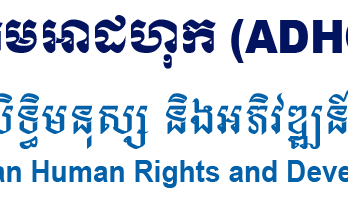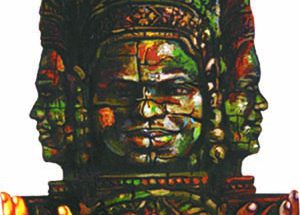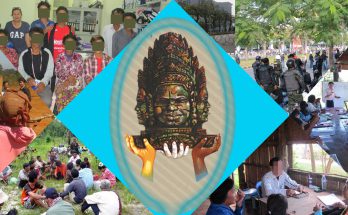PRESS STATEMENT OF THE 2012 ASEAN CIVIL SOCIETY CONFERENCE / ASEAN PEOPLES’ FORUM
Phnom Penh, Cambodia – 31 March 2012
 We, more than 1,200 delegates from all ten ASEAN countries representing various civil society organizations and movements of workers from rural and urban sectors as well as the migrant sector, peasants and farmers, women, children, youth, the elderly, persons with disabilities, urban poor, Indigenous Peoples, victims of human rights violations, domestic workers, lesbian gay transgender/transsexual intersex and queer (LGBTIQ) people, human rights defenders and other groups, gathered together in Phnom Penh for the 2012 ASEAN Civil Society Conference / Peoples’ Forum (ACSC/APF) on 29-31 March 2012, to discuss issues under the theme “Transforming ASEAN into a People Centered Community”.
We, more than 1,200 delegates from all ten ASEAN countries representing various civil society organizations and movements of workers from rural and urban sectors as well as the migrant sector, peasants and farmers, women, children, youth, the elderly, persons with disabilities, urban poor, Indigenous Peoples, victims of human rights violations, domestic workers, lesbian gay transgender/transsexual intersex and queer (LGBTIQ) people, human rights defenders and other groups, gathered together in Phnom Penh for the 2012 ASEAN Civil Society Conference / Peoples’ Forum (ACSC/APF) on 29-31 March 2012, to discuss issues under the theme “Transforming ASEAN into a People Centered Community”.
The growing awareness of ASEAN and its meetings and institutions by the region’s people is encouraging. However, we note with deep disappointment that during the ACSC/APF unacceptable restrictions were imposed on participants’ human rights to freedom of expression and assembly. Certain participants were continuously discouraged from attending the ACSC/APF, and workshops on land rights and on Burma/Myanmar were not allowed to take place.
We urge the governments of ASEAN to respect the independence of civil society organisations rather than trying to dictate their work, positions and representatives. We urge the ASEAN leaders to hold interface meetings regularly and meaningfully with civil society organisations, while fully respecting the right of civil society organisations to select their own representatives and choose the issues they want to raise during each interface meeting.
The ACSC/APF discussed and shared experiences on a wide variety of issues, paying particular attention to individuals, groups and peoples that are abused, marginalised and disempowered throughout ASEAN. The conference made detailed observations and recommendations that are available in our Joint Statement.
Among these issues, the plight of migrant workers, both formal and informal was highlighted. The ACSC/APF is alarmed that limited application of international standards protecting the rights of migrant workers and their families are properly implemented and enforced, leaving them exposed to abuse, violence and exploitation by government officials and employers. Informal and undocumented migrant workers are even more exposed to abuse and exploitation as well as to the risk of arrest and deportation.
The conference highlighted that women migrant workers, especially domestic workers, are exposed to gender-based violence including sexual abuse. Domestic workers are very rarely recognized as workers: they are therefore not protected under most national laws.
The ACSC/APF urges ASEAN states to adopt and apply international instruments, as well as a binding regional mechanism, protecting all migrant workers from trafficking, exploitation and abuse. Domestic workers and other undocumented and informal migrant workers must be recognized, and all migrant workers must enjoy the same rights as workers who are citizens of receiving countries.
The ACSC/APF convenes while the ASEAN Intergovernmental Commission on Human Rights (AICHR) is drafting the ASEAN Human Rights Declaration (AHRD). This Declaration could be a landmark in the protection of human rights in the region. We are therefore deeply disappointed at the secret, exclusionary and opaque drafting process of the AHRD. The AICHR has failed to consult ASEAN civil society to a meaningful way at the regional level. Consultations with civil society occurred only in a few member states.
Substantively, the Working Draft, which has not been officially published, discloses worrying tendencies among the drafters which, if they prevail, would provide the ASEAN people with a lower level of human rights protection than in universal and other regional instruments. There is heavy emphasis on concepts such as duties, national and regional particularities and non-interference – all of which may be abused to legitimise human rights violations. Problematic terms such as “good citizens” and “public morality” may open the door to abusive and discriminatory interpretations, in particular regarding women, LGBTIQ people, children, IPs and minorities and other often-marginalised groups. Several provisions for specific rights are inadequate, open to abuse, or else are missing key components. Thus freedom of expression, freedom of LGBTIQ people from discrimination and gender rights are not properly provided for.
We urge the AICHR to conduct wide-ranging, inclusive consultations, at both national and regional levels, during which the latest drafts of the AHRD should be discussed. AICHR should seriously consider submissions from CSOs, national human rights institutes and other stakeholders, and provide them with feedback. Drafts of the AHRD must be translated into national languages and other local languages of the ASEAN countries in order to encourage broader public engagement in the region. Provisions constraining human rights or allowing for their erosions must be removed, so that the Declaration ensures the level of human rights protection provided by universally recognized human rights standards.
Another issue highlighted during the ACSC/APF is violations of land rights. Many land deals gravely violate human rights, and impact negatively on society, local economies and the environment. In most cases, persons who live on or make a living from that land are not consulted, treated fairly or properly compensated.
Many land deals result in forced evictions, destruction of livelihoods, and conflicts between locals and investors, some of which have continued for years. In the rush for land by local powerful elites and foreign investors, many families, and often whole communities, are losing their homes and the land they rely on to grow enough food to eat and make a living.
The conference urges all ASEAN governments to immediately end land grabbing and violence against their citizens who are exercising their basic human rights to protect their land, homes and livelihoods. They must speed up the process of improving tenure security, prioritising the protection of small land owners and their livelihoods rather than pandering to investors.
Existing land use rights must be respected, irrespective of whether or not legal title or formal ownership rights exist. This includes land owned and managed by communities, land owned by Indigenous People, or others who have been farming and living on the land for generations but do not have legal documents confirming ownership. Land disputes between local communities and powerful investors must be resolved urgently and fairly. Where people are relocated, this must be done in consultation with them, and take place only once infrastructure is fully in place, including education and health facilities and job opportunities.
The ACSC/APF is starting to develop follow-up mechanisms to ensure that its recommendations are considered seriously and that concrete steps are taken for their implementation.
Finally, the ACSC/APF emphasises that ASEAN can only transform into a people-centered community if all human rights of the people are respected, including freedom of expression, assembly and association. The legitimacy of ASEAN rests on its people. The genuine participation of ASEAN people is of paramount importance in community building.
For more information, please contact the Steering Committee of ACSC/APF 2012:
Mrs. Thida Khus Email: thida_khus@silaka.org Tel: 012 83 83 64
Mr. Chhith Sam Ath Email: samath@ngoforum.org.kh Tel: 012 92 85 85
Ms. Yuyun Wahyuningrum Email: wahyuningrum@gmail.com
Ms. Khin Ohmar Email: khinhomar@burmapartnership.org
Ms.Chalida Thajareornsak Email: chalida.empowerment@gmail.com
Ms. Ivy Josiah Email: ivyjosiah@gmail.com
Mr. Sinapaan Samydorai Email: samysd@pacific.net.sg
Ms. Nina Somera Email: nina@apwld.org
Ms. Thea Soriano
See PRESS STATEMENT OF THE 2012 ASEAN CIVIL SOCIETY CONFERENCE / ASEAN PEOPLES’ FORUM (attached file)
See JOINT STATEMENT OF THE 2012 ASEAN CIVIL SOCIETY CONFERENCE / ASEAN PEOPLES’ FORUM (attached file)



